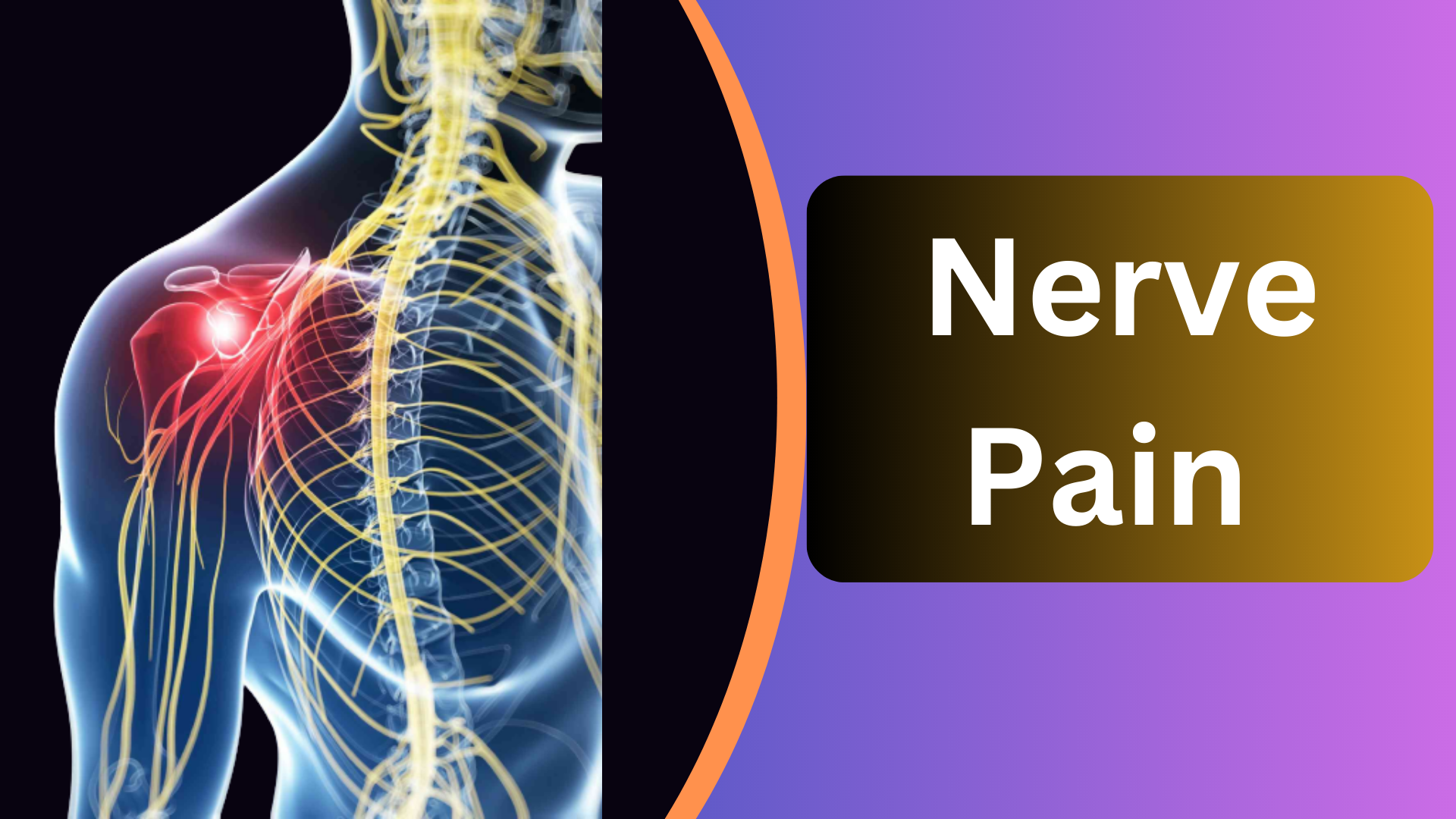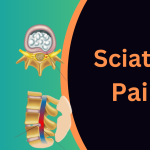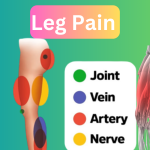Sharp or scorching pain that travels along a nerve is known as nerve pain. Although it can happen anywhere on the body, the feet and legs (Leg Pain) experience it the most frequently.
It is typically brought on by a nerve injury, inflammation, or trouble with the nervous system. Neuralgia (Pronounced: noo-RAL-jah) is another term for nerve discomfort.
Nerve pain can be intermittent or last for weeks, months, or even years called Chronic Pain of the nerve. Even a light touch might feel painful when it’s there. This might cause a person’s regular activities, such as sleeping, to be disrupted and can result in despair or anxiety.
What Are the Causes Of Nerve Pain?
The brain is linked to nerves. They communicate pain by sending messages. Stabbing pain and tingling are symptoms of damaged nerves.
Within seconds of receiving a knife cut to your finger (Finger Pain), you will experience pain. That is the result of thousands of nerves communicating pain signals to the brain. Danger equates to pain. We quit whatever is causing discomfort when we feel it.
The nerve message system, however, malfunctions in those with nerve injury. In the absence of clear stimulation, the nerves produce erroneous signals that cause pain. Nerve damage and illness are the two main causes of nerve pain.
1.) Nerve Damage
The pain in the nerves spreads after physical injury. Peripheral nerves can be permanently damaged by anything that compresses, cuts, pinches, or crushes them. Nerves in the periphery are delicate and prone to harm.
On-the-job back injuries that cause nerve damage can happen. The occupations with the greatest incidence of nerve injury are:
- Warehouse personnel
- Construction personnel
- Nursing home staff members and nurses
- Surgeons and dentists
- Gardeners, farmers, and landscaping
- Plumbers and carpenters
- Assembly-line personnel
- Mechanics
The majority of nerve injury occurs in athletes. Sports with high levels of contact, such as football, wrestling, hockey, and basketball, are the main causes of peripheral nerve damage.
2.) Nerve Diseases
Many chronic conditions and diseases can harm the nerves and cause pain in the nerves. Nerve damage brought on by degenerative disc degeneration makes the lower back and neck uncomfortable.
The shifting and pressing of an intervertebral disc on nerves cause widespread tingling or discomfort.
Nerves can be pressed against by cancerous tumors. The nerve signals pain in reaction to the pressure. Most cancer patients report feeling stabby, pinched, or scorching.
Diabetes-related nerve damage manifests as diabetic neuropathy. Extremely high blood sugar damages nerves, which causes erroneous signals to be sent to the brain. The majority of individuals report feeling numb and tingly in their legs and feet.
What Are the Symptoms of Nerve Pain?
A lot of symptoms can result from nerve damage. The cause of the nerve damage and which nerves are impacted determine the symptoms.
Sometimes, the damage to various types of nerves results in a variety of symptoms.
Symptoms of Peripheral Nerve Damage
Peripheral neuropathy causes:
- Having foot pain when walking or engaging in other everyday activities
- Lack of coordination and balance
- Muscle tremor
- Scorching or stabbing pains
- Feeling like you should be wearing gloves or socks but aren’t
Also, peripheral neuropathy can increase skin sensitivity to touch. Though they often begin in the hands and feet, symptoms can also affect a person’s arms and legs.
Symptoms of Autonomic Nerve Damage
Internal organs receive messages from autonomic nerves. They can be discovered all over the digestive system, including the stomach (Stomach Pain), liver, kidneys, bladder, lungs, and blood vessels.
Injuries to the autonomic nervous system result in issues with the colon, bladder, and digestive systems. The nerve injury could lead to irregular blood pressure changes or vertigo. Some people are unable to sweat, sweat excessively, or are heat intolerant.
Symptoms of Motor Nerve Damage
Movements and actions are governed by motor nerves. They transmit data to the muscles coming from the brain and spinal cord.
Fasciculation, muscle atrophy, and weakening are brought on by damage to the motor neurons. Paralysis can result from injury to the motor nerve in some people.
Symptoms of Sensory Nerve Damage
Afferent nerves also referred to as sensory nerves, send sensory data to the central nervous system (CNS). These nerves create sensory reactions (such as taste and smell) in response to internal or external stimuli.
Dimmer senses are the result of sensory nerve injury. A person’s ability to taste or smell things might not be as good as it once was. Numbness, burning, and prickling sensations can also result from sensory nerve loss across the body.
Best Diagnosis and Tests
Your healthcare provider will do a physical exam and ask about your symptoms. They may also do:
- A blood test.
- An EMG (electromyography), is a type of nerve examination.
- MRI of the spine or brain.
How Is Nerve Pain Treated?
Treatment for nerve pain brought on by diseases like diabetes or cancer must be aimed at curing the underlying ailment. Nerve pain and discomfort can be reduced by treating the root cause.
But occasionally, treating a medical condition does not undo nerve damage. Patients in these circumstances need to have additional care just for their nerve discomfort.
The medical management of nerve pain includes the use of anticonvulsants, antidepressants, and opioids.
For improved outcomes, some medical professionals advise combining antidepressants and anticonvulsants like, Gabapentin. Although opioids are effective for treating severe nerve pain like Aspadol 100mg and Tapaday 200mg, doctors prefer to use over-the-counter painkillers and anti-inflammatories instead.
Why is nerve pain so difficult to treat?
Each peripheral nerve is intricate in and of itself and has a very specific purpose in relation to its own specific region of the body. Given the complexity of the neurological system, it is challenging to treat once this is compromised.
What makes nerve pain worse?
At night, nerve discomfort is frequently worse. The pressure of lying down or the feel of the sheets can both be excruciatingly painful.
Make sure to tell your doctor if your nerve pain is keeping you up at night. Changing one’s lifestyle or taking medication might be beneficial.
How long does it take for nerve pain cure?
With conservative therapy, symptoms often subside and nerve function returns to normal within 6 to 12 weeks. Physical therapy and non-steroidal anti-inflammatory medicines (NSAIDs), such as ibuprofen 200mg and ibuprofen 400mg, are examples of conservative treatments.
Can nerves be repaired?
Although they can grow back and regenerate at a rate of about an inch per month, nerve cells usually experience slow and incomplete recovery.
The nerve sheath and supporting neurons have been completely cut, resulting in total nerve damage. If there is an open wound, a neurosurgeon can do surgery while seeing the damaged nerve endings.
Is nerve pain the most painful?
The trigeminal nerve, often known as the fifth cranial nerve, is afflicted by trigeminal neuralgia, also known as tic douloureux. It is among the most agonizing conditions ever.




1 Comment